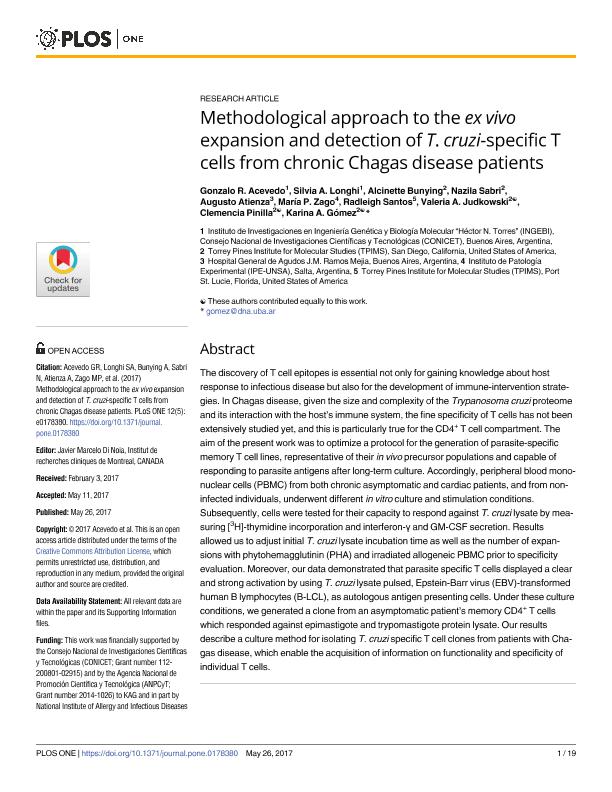Mostrar el registro sencillo del ítem
dc.contributor.author
Acevedo, Gonzalo Raúl

dc.contributor.author
Longhi, Silvia Andrea

dc.contributor.author
Bunying, Alcinette
dc.contributor.author
Sabri, Nazila
dc.contributor.author
Atienza, Augusto
dc.contributor.author
Zago, María Paola

dc.contributor.author
Santos, Radleigh
dc.contributor.author
Judkowski, Valeria A.
dc.contributor.author
Pinilla, Clemencia
dc.contributor.author
Gomez, Karina Andrea

dc.date.available
2018-04-23T18:28:45Z
dc.date.issued
2017-05-26
dc.identifier.citation
Acevedo, Gonzalo Raúl; Longhi, Silvia Andrea; Bunying, Alcinette; Sabri, Nazila; Atienza, Augusto; et al.; Methodological approach to the ex vivo expansion and detection of T. cruzi-specific T cells from chronic Chagas disease patients; Public Library of Science; Plos One; 12; 5; 26-5-2017; 1-19; e0184467
dc.identifier.issn
1932-6203
dc.identifier.uri
http://hdl.handle.net/11336/43074
dc.description.abstract
The discovery of T cell epitopes is essential not only for gaining knowledge about host response to infectious disease but also for the development of immune-intervention strategies. In Chagas disease, given the size and complexity of the Trypanosoma cruzi proteome and its interaction with the host’s immune system, the fine specificity of T cells has not been extensively studied yet, and this is particularly true for the CD4+ T cell compartment. The aim of the present work was to optimize a protocol for the generation of parasite-specific memory T cell lines, representative of their in vivo precursor populations and capable of responding to parasite antigens after long-term culture. Accordingly, peripheral blood mononuclear cells (PBMC) from both chronic asymptomatic and cardiac patients, and from non-infected individuals, underwent different in vitro culture and stimulation conditions. Subsequently, cells were tested for their capacity to respond against T. cruzi lysate by measuring [3H]-thymidine incorporation and interferon-γ and GM-CSF secretion. Results allowed us to adjust initial T. cruzi lysate incubation time as well as the number of expansions with phytohemagglutinin (PHA) and irradiated allogeneic PBMC prior to specificity evaluation. Moreover, our data demonstrated that parasite specific T cells displayed a clear and strong activation by using T. cruzi lysate pulsed, Epstein-Barr virus (EBV)-transformed human B lymphocytes (B-LCL), as autologous antigen presenting cells. Under these culture conditions, we generated a clone from an asymptomatic patient’s memory CD4+ T cells which responded against epimastigote and trypomastigote protein lysate. Our results describe a culture method for isolating T. cruzi specific T cell clones from patients with Chagas disease, which enable the acquisition of information on functionality and specificity of individual T cells.
dc.format
application/pdf
dc.language.iso
eng
dc.publisher
Public Library of Science

dc.rights
info:eu-repo/semantics/openAccess
dc.rights.uri
https://creativecommons.org/licenses/by-nc-sa/2.5/ar/
dc.subject
Chagas Disease
dc.subject
Memory T Cells
dc.subject
Trypanosoma Cruzi
dc.subject
T Cell Library
dc.subject.classification
Biología Celular, Microbiología

dc.subject.classification
Ciencias Biológicas

dc.subject.classification
CIENCIAS NATURALES Y EXACTAS

dc.subject.classification
Biología Celular, Microbiología

dc.subject.classification
Ciencias Biológicas

dc.subject.classification
CIENCIAS NATURALES Y EXACTAS

dc.title
Methodological approach to the ex vivo expansion and detection of T. cruzi-specific T cells from chronic Chagas disease patients
dc.type
info:eu-repo/semantics/article
dc.type
info:ar-repo/semantics/artículo
dc.type
info:eu-repo/semantics/publishedVersion
dc.date.updated
2017-11-03T19:34:37Z
dc.journal.volume
12
dc.journal.number
5
dc.journal.pagination
1-19; e0184467
dc.journal.pais
Estados Unidos

dc.journal.ciudad
San Francisco
dc.description.fil
Fil: Acevedo, Gonzalo Raúl. Consejo Nacional de Investigaciones Científicas y Técnicas. Instituto de Investigaciones en Ingeniería Genética y Biología Molecular "Dr. Héctor N. Torres"; Argentina
dc.description.fil
Fil: Longhi, Silvia Andrea. Consejo Nacional de Investigaciones Científicas y Técnicas. Instituto de Investigaciones en Ingeniería Genética y Biología Molecular "Dr. Héctor N. Torres"; Argentina
dc.description.fil
Fil: Bunying, Alcinette. Torrey Pines Institute for Molecular Studies; Estados Unidos
dc.description.fil
Fil: Sabri, Nazila. Torrey Pines Institute for Molecular Studies; Estados Unidos
dc.description.fil
Fil: Atienza, Augusto. Gobierno de la Ciudad de Buenos Aires. Hospital General de Agudos ; Argentina
dc.description.fil
Fil: Zago, María Paola. Consejo Nacional de Investigaciones Científicas y Técnicas. Centro Científico Tecnológico Conicet - Salta. Instituto de Patología Experimental. Universidad Nacional de Salta. Facultad de Ciencias de la Salud. Instituto de Patología Experimental; Argentina
dc.description.fil
Fil: Santos, Radleigh. Torrey Pines Institute for Molecular Studies; Estados Unidos
dc.description.fil
Fil: Judkowski, Valeria A.. Torrey Pines Institute for Molecular Studies; Estados Unidos
dc.description.fil
Fil: Pinilla, Clemencia. Torrey Pines Institute for Molecular Studies; Estados Unidos
dc.description.fil
Fil: Gomez, Karina Andrea. Consejo Nacional de Investigaciones Científicas y Técnicas. Instituto de Investigaciones en Ingeniería Genética y Biología Molecular "Dr. Héctor N. Torres"; Argentina
dc.journal.title
Plos One

dc.relation.alternativeid
info:eu-repo/semantics/altIdentifier/doi/http://dx.doi.org/10.1371/journal.pone.0178380
dc.relation.alternativeid
info:eu-repo/semantics/altIdentifier/url/http://journals.plos.org/plosone/article?id=10.1371/journal.pone.0178380
Archivos asociados
